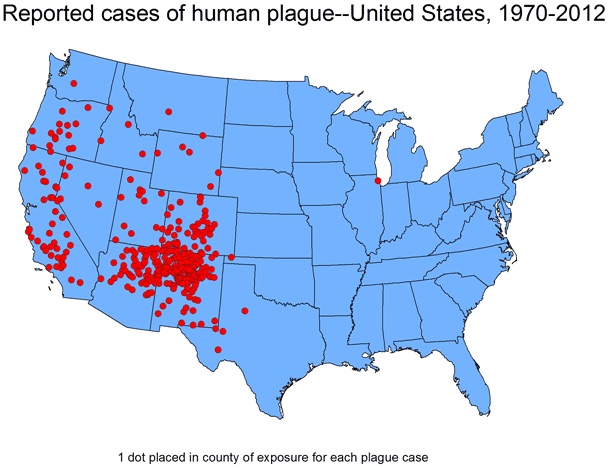
If you thought bubonic plague was done with the end of the dark ages, think again.
In the western United States incidents of bubonic plague are on the rise. Sharply.
While it's been pretty steady over the last hundred years or so with an average of three to seven human cases of it reported annually, so far, in 2015, there have been 14 cases of it reported in the United States.
Four people have died of it.
But the recently diagnosed case in a Marquette man was Michigan's first.
It's also likely to be one of very few, if not the only one, says said Jennifer Smith, a spokeswoman for the Michigan Department of Health and Human Services.
It's believed the man contracted the disease from the bite of an infected flea while he was in Colorado and this form of the plague is not contagious from human-to-human.
The Marquette man is resting and recovering as he undergoes treatment and is expected to make a full recovery, Smith said.
In his case, the bubonic plague didn't develop into the true black plague, pneumonic plague.
The full text of a release from the Michigan Department of Health and Human Services follows.
The individual is a Marquette county resident, and recovering after receiving appropriate treatment.
Public health officials have said there is no concern regarding human-to-human transmission in this case.
This is Michigan’s first plague diagnosis, and the fourteenth case reported nationally in 2015.
Plague is a rare, life-threatening, flea-borne illness caused by the bacterium Yersinia pestis.
This bacteria occurs in nature among wild rodents and their fleas in rural and semi-rural areas of the western United States.
Nationally, an average of three human cases of plague are reported annually.
The western United States is experiencing an increase in reported cases of plague in 2015, with 14 human cases including four deaths reported.
The reason for the increase is not known.
The risk for contracting plague is generally highest in settings that provide food and shelter for rodents, such as campsites, cabins, and other rural or semi-rural settings.
“People who are traveling and recreating outdoors in the western U.S.. should be aware of the risk for exposure to plague,” said Dr. Eden Wells, Chief Medical Executive for MDHHS. “Use insect repellent on your clothing and skin and make sure that any pets that may be along are receiving regular flea treatments.”
Plague does not naturally occur in Michigan, and this is the first ever report of plague in a resident of Michigan.
People are most often infected when they are bitten by infected fleas or have direct contact with the tissues or body fluids from an infected animal that is sick with plague, which can include domestic pets.
Human-to-human transmission is rare and typically requires direct and close contact with a person with pneumonic plague.
Illness typically begins 2-6 days after exposure.
Human plague is a potentially fatal illness characterized by the sudden onset of fever and malaise, which can be accompanied by abdominal pain, nausea, and vomiting.
There are three main forms of plague.
Bubonic plague is the most common and results from the bite of an infected flea; patients develop painful swelling of one or several lymph nodes.
Health care providers should consider plague in any patient with compatible signs or symptoms, residence or travel in the western United States, and recent proximity to rodent habitats or direct contact with rodents or ill domestic pets.
Plague is a very serious illness, but is treatable with common antibiotics.
The earlier that a patient seeks medical care and receives treatment, the better the chance for a full recovery.
People engaging in outdoor activities in areas where plague is endemic should wear long pants when possible and use insect repellent on clothing and skin.
Persons should also avoid direct contact with ill or dead animals and not feed small rodents when living or traveling in plague-endemic areas.
For the most up-to-date information about plague, including maps with locations of recent human cases, visit www.cdc.gov/plague/
*************************